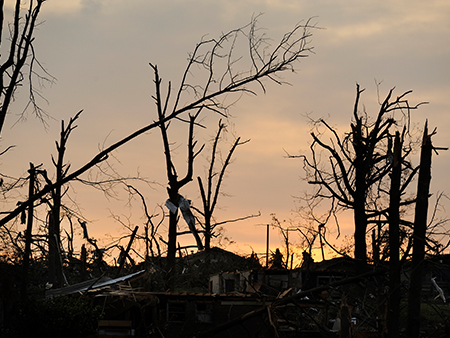 In many parts of the country, tornado warnings and threats are commonplace in the spring and the early summer months. Many people have experienced an active tornado in their communities firsthand, watching the physical devastation unfold in real time.
In many parts of the country, tornado warnings and threats are commonplace in the spring and the early summer months. Many people have experienced an active tornado in their communities firsthand, watching the physical devastation unfold in real time.
While communities and individuals tend to have physical disaster plans in place, there is a great deal of emotional trauma and stress linked to experiencing severe weather threats, most especially in the aftermath of a disaster.
“Reactions vary from person to person; but we see that strong emotional reactions occur after the threat of severe weather, especially in people who have experienced weather-related trauma before,” said David Knight, Ph.D., associate professor in the University of Alabama at Birmingham Department of Psychology.
Knight explains that the emotional impact that often comes with severe weather threats — particularly tornadoes — can occur in the form of:
- Reliving the event in flashbacks or dreams
- Mood changes, such as depression or heightened anxiety
- Avoidance of people or places where trauma was experienced
- Hyperarousal, which can include a racing heartbeat, trouble catching breath, being easily startled
- Cognitive function, which can include difficulty concentrating, excessive anxiety and/or worry
- Fatigue, appetite changes, crying unexpectedly
|
“When somebody has been exposed to a weather threat like a tornado and others are approaching, their emotional reserves are already depleated.” |
“Because of the unpredictable nature of tornadoes and the lack of control we have over Mother Nature, these threats of weather and/or potential for impact can be frightening because we’re experiencing a threat to our lives, loved ones and belongings,” Knight explained. “Often there is a period of adjustment after a storm or threat of severe weather, and it’s OK to have a range of emotional responses for any period of time afterward. Knowing that can in some ways be comforting and help us manage emotions when we experience the next threat.”
It is common in the Midwest and South for severe weather threats to follow one after another this time of year, even after disaster strikes. The emotional toll — while natural — can be exhausting.
“For most people, their emotional reserves have been depleted either after seeking shelter in a safe space or after a tornado does hit their community, so it makes regulating emotions even more difficult,” Knight said. “There hasn’t been adequate time to adjust and routines are disrupted, so people should know that it is normal to feel overwhelmed or unsettled.”
However, for those who experience the warnings of severe weather — particularly during tornado season — Knight wants people to know there are ways to cope, including:
- Knowing it will take time for life to adjust and get back to normal
- Talking about the experience
- Asking for help
- Taking time for healthy behaviors like rest, exercise and healthy eating
- Forming routines to structure the day
- Helping others
“Disaster is not permanent; but emotions can linger for days, months or years, especially if there is a rebuilding phase that people experience,” Knight said. “Being prepared for severe weather season — both physicaly and emotionally — can help people cope with overwhelming feelings they are likely to re-experience when the next threat of severe weather occurs.”